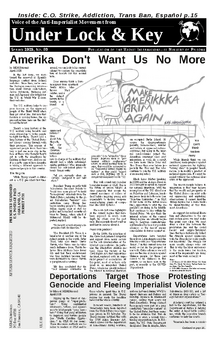
Fighting Enemies in the Prison Movement
On July 7, 2012 a kite was passed to me, and it read as follows:
“I might be in some trouble. You don’t know me and this is going to blow your mind. If I die in the next day Sr. Menendez in Unit 11 is responsible and probably the warden too. They are going to use inmates to do it. I threatened the warden with letters to the health department about blatant violations in the culinary and the way they do laundry and other things they are getting away with in here. If you hear of an inmate dying in the next couple of days don’t let my death go in vain.”
Without addressing the veracity of this communication, it is disturbing for a number of reasons (aside from the obvious). First and foremost is the specter of the state’s use of inmates (and I use “inmates” here in the most specifically derogatory and anti-revolutionary sense of the term) to do their bidding. That a prisoner who sought to expose an evil visited upon us all would then have to fear reprisal from fellow targets of the evil, at the direction of the oppressor, is treachery of a singularly despicable character. (This is nothing new, but its nature has become more dominant, as is discussed below.) This is aside from the actual violation of our most fundamental constitutional and human rights, the subsequent retaliation for exposing this malfeasance of prison officials and the complete and utter disregard and contempt for human dignity.
This “tool” culture is becoming increasingly prevalent. Today, not only do we revolutionary and activist prisoners have to combat the oppressors themselves, but we must overcome their minions within the ranks of the oppressed as well – we must be ever vigilant against their agents among us. Not in the ordinary sense of infiltrators and narcs, but a whole culture of puppets, sympathizers and panderers intoxicated by imperialist fictions. What is truly frightening about this new breed of traitor is this fact: they want no recompense for their treachery. They believe in the rightness of the betrayal. They believe in the rightness of their loyalty to the oppressor, the enemy. These “people” are not seeking gain. They are an enemy cadre, steeped in enemy thought and ideology. They are (in the truest sense) patriotic Amerikkkans.
Doubtless, the state creates deprivations and uses these deprivations as bargaining chips to enlist the aid of petty snitches and unsavories of all types. That is never going to change in or out of prison. That is not the same animal. What is named here is a devoted enemy, an unrecognized and unofficial extension of the state in both thought and deed.
We must be aware of this counter-revolutionary element and be prepared to deal with them as they arise. There is increased urgency for A) the unification of all revolutionaries and activists regardless of race, religion, gender, custody, set or hood; B) critical analyses of the battle field without set mentalities; and C) application of the principles and theory which arise out of critical analyses. We must rethink our strategies and possibly our associations and act based upon what we have been taught by our conditions, not by what we feel or desire. The local conditions as applied to the global struggle should advise us – not predilection.
The only reason why we have remained oppressed is the enemy’s effective and continuous infiltration and dis-empowerment. It is the enemy’s ability to disunite and exploit this disunity, which provides them with a critical advantage. These are textbook guerrilla tactics which continue to work and reinforce the need for a steel-willed revolutionary vanguard. As such, we must immediately re-evaluate our objectives and tactical assessments, and evolve to meet the pale of the enemy. This requires that we take a long hard look at our environment and account for this emerging class of “enemy combatants.”
A friend of the enemy is still an enemy.
MIM(Prisons) responds: We recently announced a day of solidarity for the United Front for Peace in Prisons, which in part is about promoting the five principles to discourage the kind of petty back-biting where prisoners will sell out for small favors from the pigs. But this comrade brings up a good point, that not all prisoners can be won over. The divisions created by the oppressors are not just individuals bought off to carry out individual reactionary acts in exchange for favors, but also individuals who buy in to the Amerikan political ideology and truly support imperialism as a system. Both groups are dangerous to the movement. We must protect ourselves from these people, both by trying to turn them to the side of the oppressed while exposing them and avoiding their traps and aggression.








